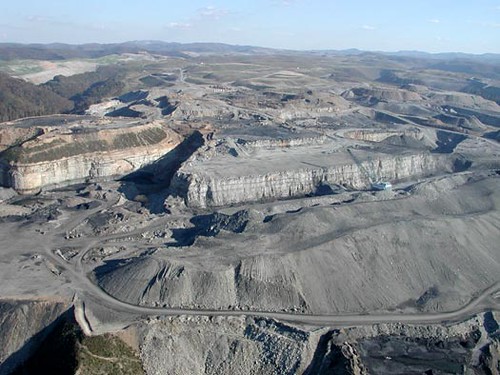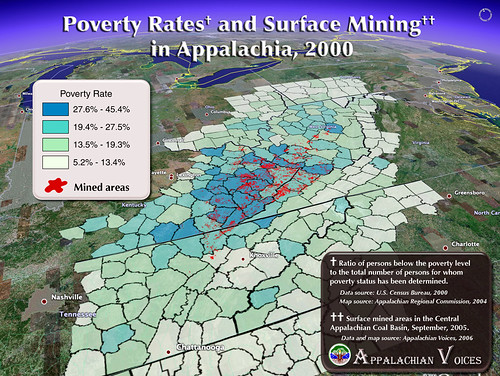Gore: Mountaintop Removal is a CRIME, and ought to be Treated as a Crime
By: faithfull
Published On: 4/28/2008 1:16:10 PM
Al Gore:
Mountaintop removal is a crime and ought to be treated as a crime
 Al Gore recently addressed West Virginia resident Ed Wiley, Ed's granddaughter Kayla, and the audience at the 2008 Nashville film festival, to present Director Michael O' Connell the 2008 "Reel Current Award" for his most recent piece "Mountain Top Removal."
Al Gore recently addressed West Virginia resident Ed Wiley, Ed's granddaughter Kayla, and the audience at the 2008 Nashville film festival, to present Director Michael O' Connell the 2008 "Reel Current Award" for his most recent piece "Mountain Top Removal."
You'll remember Ed Wiley as the grandfather who walked 455 miles from Charleston WV to Washington DC to speak with Senator Byrd about mountaintop removal mining in his community, and Marsh Fork Elementary School which sits right below a sludge impoundment holding 2.8 billion gallons of toxic sludge.
Gore on MTR:
[MTR] just kills the landscape, and it kills the prospect for Kayla and her generation to have the same kind of beautiful place to live and the same healthy place to live. And all for what?
...

Kayla's grandfather Ed Wiley took it upon himself to say "I'm gonna take this message to where somebody can hear it who can do something about it. And he walked 450 miles with a flag and a homemade flagstaff over his shoulder to Washington DC. And I admire that a lot Ed. But they didn't respond, not really. Then he went to the Governor's office, and then the courts got a hold of it. And of course the way our democracy is operating these days with the influence of big money being way out of bounds to what it should be - that produces way more of a response than a family, a grandfather thinking about his grand-daughter and her generation which should be right up there in first place when these decisions are made. But instead all these high priced lawyers and lobbyists and all the money thats thrown at this, it just twists the outcome of the legal proceedings, of the legislative proceedings, of the Congressional proceedings. And this is going on in Appalachia and similar activities are going on all over the world.
...
We've got to change this pattern of cutting off the tops of these mountains and just condemning future generations in Appalachia to a diminished future, and there are many of them, starting with this family that are standing up clearly and forcefully and saying "Its not right."
...
And the proposals to stop this mountaintop mining have also gone nowhere. Now why is that? The influence of the groups that are making so much money on this and caring so little about the consequences has just overwhelmed what families are going through and are overwhelming what a grandfather thinks about when he thinks of how his granddaughter is going to grow up in the community where he grew up. So I hope that this film will help others to connect the dots the way it helped Tipper and me to connect the dots on the relationship between mountaintop removal - which is a crime and ought to be treated as a crime - and the results of burning it without regard to the future, which also ought to be treated as just an unacceptable practice. So, you can tell I feel strongly about this and have for a long time but the feelings I'm expressing here were really evoked in a significant way by this movie. So I want to formally congratulate and thank Michael O Connell and present him with the Reel Current Award.
Also, please watch Ed Wiley speak in the last 2 minutes. He is a brilliant man.
- - -

Mountaintop removal - which produces just 5% of America's energy - is putting 100s of rare and endangered species at risk of extinction, has destroyed 474 mountains, has buried and polluted 1200 miles of American headwater streams, and destroyed over 1 million acres of the most biodiverse and productive forests in the temperate world.
Yet, Appalachian coal mining communities are losing jobs and remain some of the most impoverished communities in the United States of America.

- - -
Where are the Presidential candidates on mountaintop removal?
With the primaries coming up in West Virginia and Kentucky, it is important that the candidates represent the will of the majority of West Virginians and the vast majority of Americans and oppose mountaintop removal coal mining.
You can also help by asking your Congressperson to co-sponsor the Clean Water Protection Act (HR 2169).
Comments
Great diary. (Lowell - 4/28/2008 3:38:49 PM)
Thanks!
 Al Gore recently addressed West Virginia resident Ed Wiley, Ed's granddaughter Kayla, and the audience at the 2008 Nashville film festival, to present Director Michael O' Connell the 2008 "Reel Current Award" for his most recent piece "Mountain Top Removal."
Al Gore recently addressed West Virginia resident Ed Wiley, Ed's granddaughter Kayla, and the audience at the 2008 Nashville film festival, to present Director Michael O' Connell the 2008 "Reel Current Award" for his most recent piece "Mountain Top Removal."


